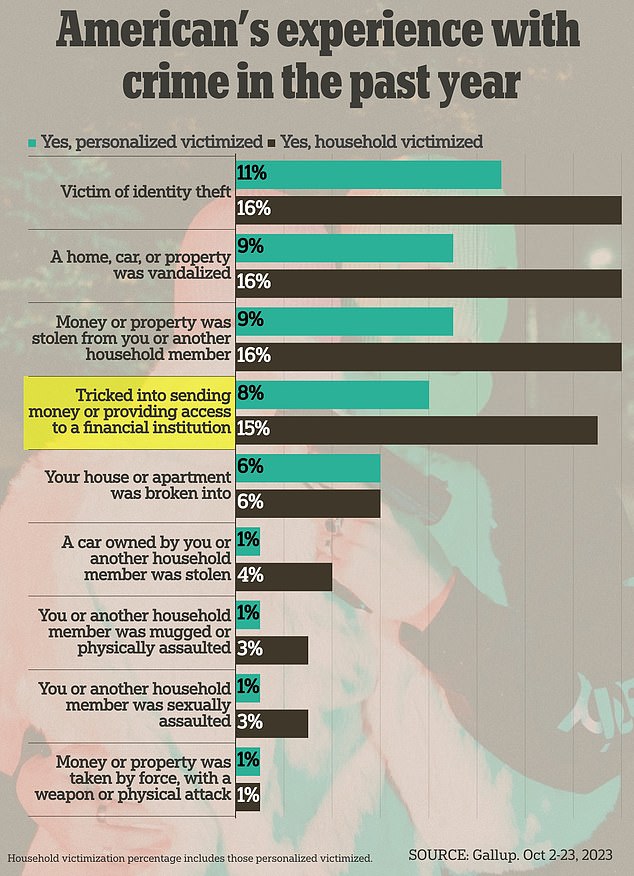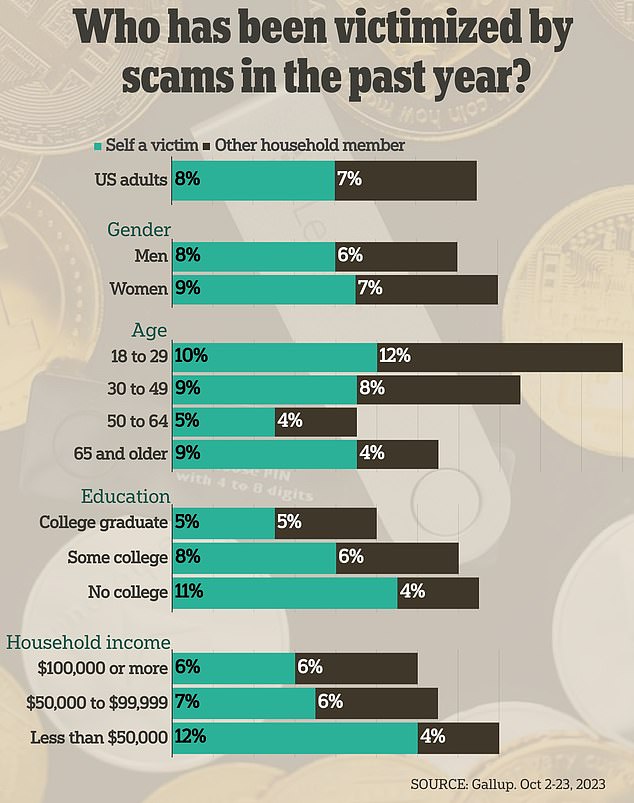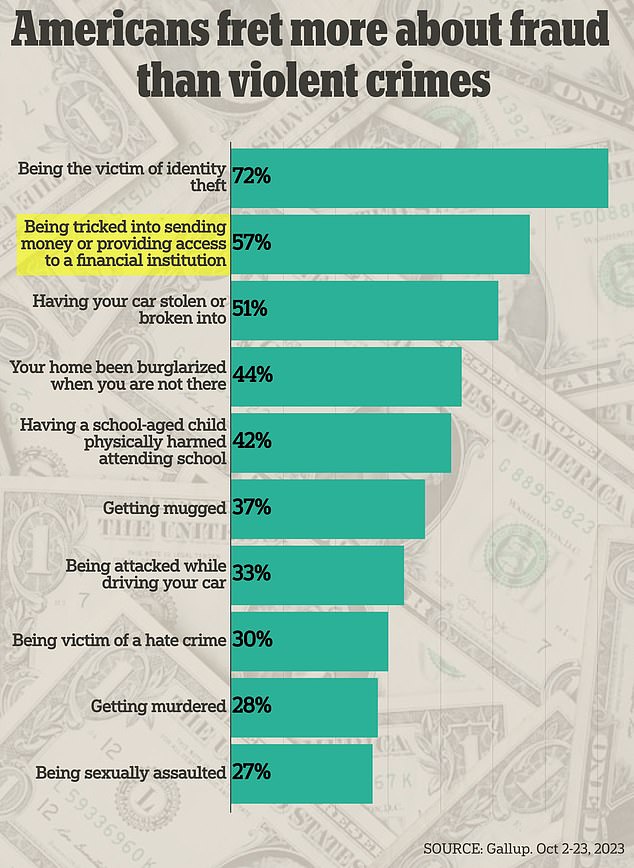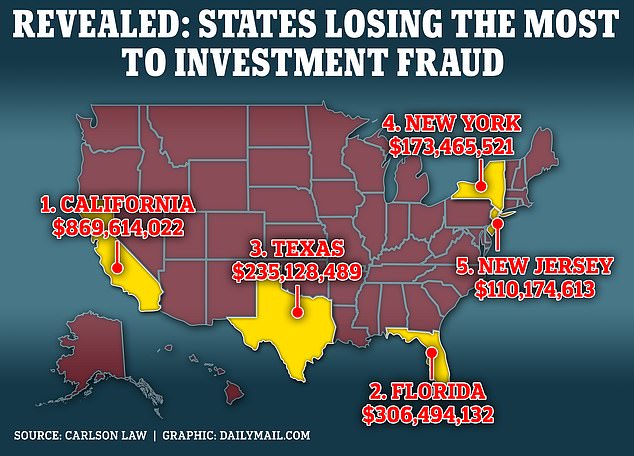United States of SCAM-ERICA: A staggering 21 million adults were duped into bogus crypto trades and other cons this past year – but do fraudsters have their eyes on YOU?

A staggering 21 million people were duped into fake cryptocurrency schemes and other cons this past year, and most Americans are worried about becoming the next victim of one, a survey shows.
Polling firm Gallup found that 8 percent of adults had been personally tricked by a scammer into sending money, while 15 percent said the same thing had happened to a member of their household.
This makes financial cons the fourth most prevalent crime in the US after identity theft, vandalization of property, and property theft, the group’s nationwide survey of 1,009 adults last month shows.
Among the victims were Michael Holloway, 62, a real estate agent from New Jersey, who was conned out of $500,000, and Tech executive Shreya Datta, 37, who lost $450,000 when she was tricked.

Michael Holloway, a 62-year-old real estate agent from New Jersey, was conned out of $500,000

The 8 percent of conned adults amounts to some 21 million Americans falling prey to scams
Scammers use many cruel techniques to part people of their money — by pretending to represent a charity, a debt collector, or even a relative or colleague in a tight spot who needs an emergency cash transfer.
Holloway fell for a heartless scam known as ‘pig butchering,’ whereby victims are ‘fattened up’ with a fake relationship — whether romantic or friendly — before being ‘butchered’ by fraudulent investment advice.
According to Gallup, the scourge is now ‘ubiquitous.’
‘The toll this is taking on the American public is evident in the relatively high percentage saying their household was affected in the past year,’ the group said in its polling report.
‘It also adds to the mental stress Americans must bear, scoring high on their list of crime worries and potentially taking some of the joy out of holiday shopping.’
Americans now fear fraud and identity theft more than all other crimes.
Nearly three quarters of respondents said they worry about having their identity hacked, while nearly six-in-ten said being tricked by a scammer was on their mind ‘frequently’ or ‘occasionally.’
That’s many more people than fret about having their car stolen, being mugged or having their home burglarized.
Researchers also found that some people were more likely to be swindled than others.
Young people get it worse — a tenth of those aged 18-29 were scammed this past year.

Watch out for scammers reaching out by messaging or other cell phone apps

The young, poor, elderly, and uneducated are more likely to get swindled than others
The elderly are another popular target — 9 percent of those aged 65 and older were duped these past 12 months.
Those less educated are ripe for a sting — 11 percent of those without a college degree were scammed.
So are the poor. Those earning less than $50,000 per year were scammed twice as much as those on $100,000 or more, researchers said.
Also, women get hustled slightly more often than men
After they’ve been hit, few victims tell the police.
Of the estimated 21 million people scammed this year, only 2.4 million cases were reported to the Federal Trade Commission (FTC), which collects data on frauds.
Many of them likely ‘felt embarrassed about having been duped’ or assumed that ‘nothing could be done’ about the crime, Gallup said.
Among the crushed fraud victims is Holloway, a dad of three who lost his life savings, his home and his wife after he was tricked into investing in bogus cryptocurrency schemes by two women he met on social media.
Holloway was conned out of $500,000 by online fraudsters, who lured him in with fake relationships before persuading him to drain his entire retirement pot in a ‘pig butchering’ scam.

Michael explained how he was targeted on social media – and was initially wary of would-be scammers reaching out to him

Cons and identity theft worry Americans more than carjackings and burglaries
He was so distraught by falling victim to the cruel ruse that he hit ‘rock bottom’, was ‘ready to end his life’ — and ultimately ended up being rushed to hospital by his concerned daughter.
Speaking exclusively to DailyMail.com, Holloway explained how he was targeted on social media — and was initially wary of would-be scammers reaching out to him.
‘If I made a successful deal I would post it on social media, and I started getting random people hitting me up — and they would always mention cryptocurrency investment. I would tell them to forget it — I knew what they wanted and I was onto them,’ he said.
But in early December 2022, a woman called ‘Hui Hui’, who said she was from China, reached out to him.
‘I was complaining to her that so many people were trying to get me to invest. It kept on like a friendly chat at first,’ he said.
Holloway admitted that he was having some trouble with his marriage at the time and he was in a vulnerable mindset. The online conversation turned romantic — with plans for the pair to potentially meet.
This is when ‘Hui Hui’ brought up investing in a cryptocurrency platform, and persuaded Holloway to invest $18,000.
On December 21, another woman called ‘Lydia’ reached out to Holloway on social media.
She too said she was Chinese, and claimed to be a successful businesswoman — even sending Holloway photos of a Bentley she claimed to own.
‘Again, she was very casual in her approach’ he said. ‘I felt comfortable talking to her and we switched to speaking on WhatsApp. It was not a romantic relationship, but she was portraying that she was my friend and she was able to gain my trust.’
Holloway was growing suspicious about the money he had invested with ‘Hui Hui’, and even complained to ‘Lydia’ about the situation, explaining that he was anxious to get the money back.

Rebecca Holloway, pictured, revealed how she lost her entire 401(K) to a scammer she met on Tinder after he convinced her to invest in bogus cryptocurrency schemes
It was not until three months into speaking that ‘Lydia’ brought up an investment opportunity.
‘She said: ‘By the way, I can get you a lot more money. My aunt is a Wall Street trader and we’re doing a special project, and you’re invited’,’ Holloway said.
He read the whitepapers and performed a stress test with the first $20,000 he invested, which he was able to pull from the platform.
‘I was brainwashed,’ he continued. ‘She wouldn’t let me think on my own or let me go for one second. Without a beat those texts were coming in and I believed it.
‘She was promising me a life of riches and I was attracted to the idea of making quick profits. I should have known better.’
Holloway started investing in the platform, even taking money from his 401(K) plan and forfeiting the 20 percent penalty each time.
When, in April this year, Holloway tried to pull his money out of the first platform he had invested in, he was hit by a $132,000 penalty.
Panicking, he tried to take money out of the scheme he had invested in with ‘Lydia’ — and a $50,000 penalty popped up.
This, he said, is when it dawned on him that he had fallen victim to sophisticated scammers.
‘My face turned bright red — I remembered the actual moment it happened,’ he said.
‘Between the two accounts I lost $500,000. I lost my house, I lost my wife when she found out what I had been doing, I lost my money. I was ready to end my life. I was really at a rock bottom place.

Kate, 41, who used a pseudonym for the piece, lost $80,000 to a ‘pig butchering’ scam

California residents lost the most money to investment fraud last year, with 4,982 victims being conned out of a huge $870 million
‘I ended up having a nervous breakdown and my daughter rushed me to hospital and I was placed in a mental health ward.’
While Holloway is now rebuilding his life, living in an apartment and is on good terms with his ex-wife and children, he said, he is keen to warn others of the life-changing repercussions of such scams.
Looking back, he recognizes the red flags which are typical of ‘pig-butchering’ cases.
The con tends to be long-winded and sees the scammer engage in a months-long courtship to build up trust.
Crooks will often allow victims to withdraw money easily from the investment app in the beginning — but once they have invested heavily they will lose this option.
‘Ironically, I knew about this type of scam and even mentioned the term to both women. They apparently had me so brainwashed or were somehow able to convince me otherwise,’ Holloway added.
And Michael is by no means alone. Experts warn the crime is exploding across the country, and investment fraud is now the fastest-growing scam in the US.
Americans lost a record $2.57 billion to cryptocurrency investment fraud last year alone, according to the FBI, which is almost three times the amount stolen in 2021.
Rebecca Holloway, 42, missed similar warning signs when she was swindled out of more than $100,000 by fraudsters posing as a French entrepreneur called ‘Fred.’
She told DailyMail.com: ‘Single women approaching middle-age are so vulnerable.
‘We have money but we might not have met the right guy yet. And suddenly this good-looking man starts talking to you and you’re excited.

Tech executive Shreya Datta, 37, lost $450,000 to a heartless ‘pig-butchering’ con
‘Looking back, the signs are so obvious. But at the time you want to believe it’s real.’
A record $3.82 billion was stolen from Americans through investment fraud in 2022, according to the Federal Trade Commission (FTC) — more than any other type of scam.
This was a 128 percent increase on the $1.67 billion lost the previous year.
Investment scams are wide-reaching, and can take in any hoax that tricks victims into putting money in a phony scheme with the promise of lucrative returns.
This can include Ponzi schemes and even people being persuaded to invest in ‘phantom properties’ that don’t exist.
A recent study by investment fraud attorneys Carlson Law found the bulk of the losses were in California — followed by Florida, Texas, New York and New Jersey respectively.
Tech executive Shreya Datta, 37, and single mum Kate, 41 both revealed they lost $450,000 and $80,0000 respectively in cons eerily similar to what happened to Rebecca Holloway.
Kate, from Vancouver, Washington, also believed she had met a French entrepreneur online — though he said he lived in Seattle.
The conman claimed to be called ‘Andy’ and working as a wine trader. Over time, the duo struck up a relationship when he convinced her to invest $80,000.
‘I was the perfect sucker in a way because I knew nothing about cryptocurrencies,’ Kate, who used a pseudonym for the piece, said.
Tech executive Datta also believed she was talking to a French wine trader — who ended up conning her out $450,000.
Shreya — who earns a six-figure salary in a global tech firm — told the Philadelphia Inquirer she had felt as though she had ‘a hole in my soul for not having a man in my life’ — hence why she was tricked.
‘I was in a trance,’ she said, adding ‘it’s like my psychology was hacked.’
Many pig-butchering operations are reportedly run by criminal syndicates in Cambodia, which employ thousands of people.
A report by Vice News and the South China Morning Post found last year that workers themselves are enslaved and abused, having been lured there with the promise of a legitimate job, and are given scripts tailored to individual victims.







